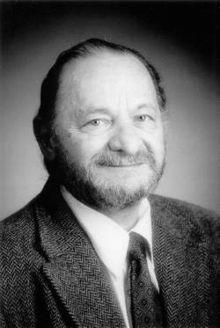Nathan Mantel | |
|---|---|
 | |
| Born | February 16, 1919 |
| Died | May 26, 2002 (aged 83) |
| Nationality | United States |
| Occupation | biostatistician |
| Known for | Mantel test |
Nathan Mantel (February 16, 1919 – May 26, 2002) was an American biostatistician best known for his work with William Haenszel which led to the Mantel–Haenszel test and its associated estimate, the Mantel–Haenszel odds ratio. The Mantel–Haenszel procedure and its extensions allow data from several sources or groups to be combined while avoiding confounding.[1]
He spent much of his career working for the National Cancer Institute. During his career, he published over 380 academic papers. Later in his life, Mantel was known for defending the tobacco industry against claims that passive smoking was harmful.[2]
See also
- Mantel test
- Logrank test
References
- ^ Mantel, N.; Haenszel, W. (1959), "Statistical aspects of the analysis of data from the retrospective analysis of disease", Journal of the National Cancer Institute, 22 (4): 719–748, doi:10.1093/jnci/22.4.719, PMID 13655060.
- ^ Woods, Michael (July 18, 1981). "'Passive Smoking' Report is Disputed". Pittsburgh Post-Gazette.
- Hale, Lauren; Hale, Benjamin (2005), "Mantel, Nathan", Encyclopedia of Biostatistics, Wiley Interscience, doi:10.1002/0470011815.b2a17093, ISBN 047084907X
Further reading
- Colton, Theodore; Wittes, Janet; Gail, Mitchell H.; Greenhouse, Samuel W. (1999), "Papers in honour of Nathan Mantel's 80th birthday", Statistics in Medicine, 18 (24): 3379–3408, doi:10.1002/(SICI)1097-0258(19991230)18:24<3379::AID-SIM456>3.0.CO;2-6, archived from the original on 2013-01-05